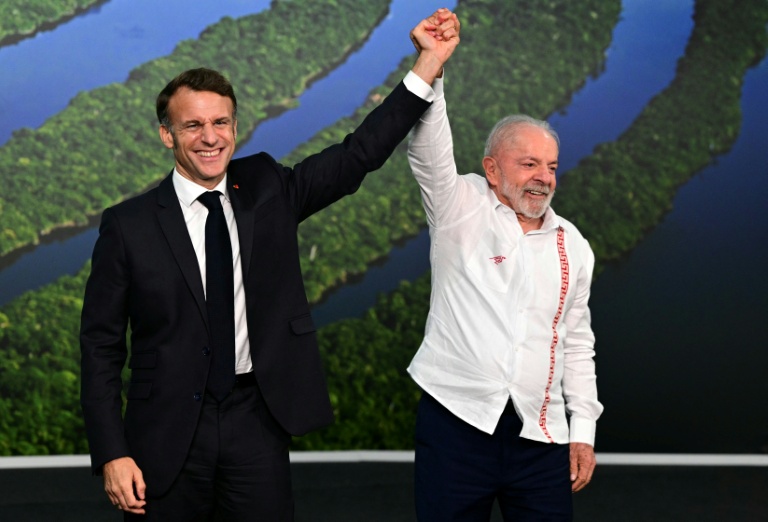World
Global Leaders Intensify Calls for Fossil Fuel Transition at Amazon Summit

World leaders are gathering for a second day of climate discussions in the Brazilian Amazon, focusing on urgent measures to combat fossil fuel dependency. The summit, held in Belem, precedes the United Nations’ annual climate conference, COP30, set to begin on March 18, 2024. The opening session featured impassioned speeches and sharp critiques aimed at major oil companies, emphasizing the immediate need for action against climate change.
In recent years, the impacts of climate change have become increasingly evident. The past 11 years have been recorded as the hottest, with rising temperatures resulting in severe hurricanes, heat waves, and wildfires. UN Secretary-General Antonio Guterres and various national leaders have conveyed a grim outlook, noting that the world is unlikely to maintain the 1.5°C target established in the Paris Agreement. Nonetheless, they are still hopeful about achieving the secondary goal of limiting warming to 2°C.
The absence of representatives from the world’s largest polluting nations, particularly the United States, where climate change has been downplayed by former President Donald Trump, has raised concerns. This gap in leadership has prompted calls for stronger international cooperation and mobilization. At the previous COP28 in Dubai, countries made a significant commitment to transition away from oil, gas, and coal, but recent economic challenges and geopolitical tensions have shifted focus away from this pledge.
Brazilian President Luiz Inacio Lula da Silva received applause for his opening remarks, where he called for a comprehensive “roadmap” to address deforestation and fossil fuel reliance. This initiative has garnered support from several European nations and vulnerable island states, whose futures are threatened by climate-induced natural disasters.
Prime Minister Gaston Browne of Antigua and Barbuda decried the actions of large polluters, asserting their role in harming both marine and terrestrial environments through fossil fuel emissions. In Europe, momentum for phasing out hydrocarbons is also building. EU countries, despite their internal divisions, have successfully reduced greenhouse gas emissions for over three decades and are targeting a 90% reduction by 2040.
Finnish President Alexander Stubb emphasized that COP30 must convey a definitive message regarding the necessity of the green transition. He stated, “Fossil fuels have no future,” reflecting a growing consensus among leaders for a shift towards sustainable energy sources.
Marta Salomon from the Brazilian think tank Politicas Climaticas do Instituto Talanoa highlighted the significance of Lula’s roadmap, viewing it as a positive development for ongoing discussions at COP30. While Lula acknowledged the challenges of reducing fossil fuel dependency, Brazil has recently permitted its state oil company to begin offshore exploration in the Amazon, complicating the conversation around fossil fuel policies.
The likelihood of a formal resolution against fossil fuels emerging from Belem seems slim, given the need for consensus among nearly 200 countries participating in the conference. Nonetheless, COP30 will offer a platform for countries to showcase their voluntary pledges and progress towards implementation. This could lead to renewed commitments regarding methane emissions, a potent greenhouse gas primarily associated with natural gas production.
Barbados Prime Minister Mia Mottley, recognized for her influence in climate diplomacy, stressed the importance of addressing methane, stating, “The world must pull the methane brake.” With a diverse representation of 2,400 staff from over 100 nationalities, the summit aims to facilitate global dialogue on the pressing issue of climate change and foster collaborative efforts toward sustainable solutions.
As the second day of talks unfolds, the focus will remain on actionable strategies to combat climate change, with leaders emphasizing the urgency of transitioning away from fossil fuels to safeguard the planet for future generations.
-

 Science3 months ago
Science3 months agoToyoake City Proposes Daily Two-Hour Smartphone Use Limit
-

 Health3 months ago
Health3 months agoB.C. Review Reveals Urgent Need for Rare-Disease Drug Reforms
-

 Top Stories3 months ago
Top Stories3 months agoPedestrian Fatally Injured in Esquimalt Collision on August 14
-

 Technology3 months ago
Technology3 months agoDark Adventure Game “Bye Sweet Carole” Set for October Release
-

 World3 months ago
World3 months agoJimmy Lai’s Defense Challenges Charges Under National Security Law
-

 Lifestyle3 months ago
Lifestyle3 months agoVictoria’s Pop-Up Shop Shines Light on B.C.’s Wolf Cull
-

 Technology3 months ago
Technology3 months agoKonami Revives Iconic Metal Gear Solid Delta Ahead of Release
-

 Technology3 months ago
Technology3 months agoApple Expands Self-Service Repair Program to Canada
-

 Technology3 months ago
Technology3 months agoSnapmaker U1 Color 3D Printer Redefines Speed and Sustainability
-

 Technology3 months ago
Technology3 months agoAION Folding Knife: Redefining EDC Design with Premium Materials
-

 Technology3 months ago
Technology3 months agoSolve Today’s Wordle Challenge: Hints and Answer for August 19
-

 Business3 months ago
Business3 months agoGordon Murray Automotive Unveils S1 LM and Le Mans GTR at Monterey









